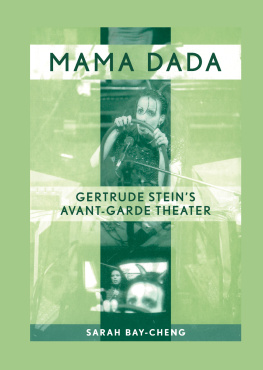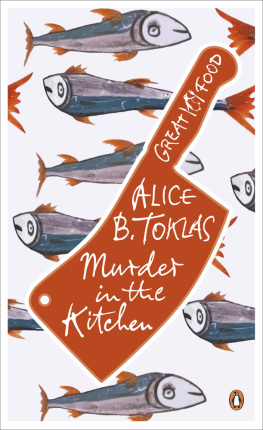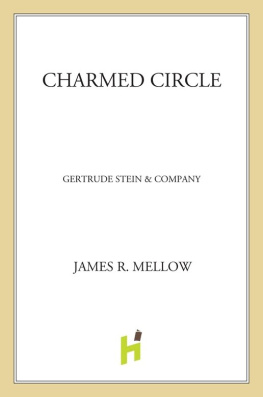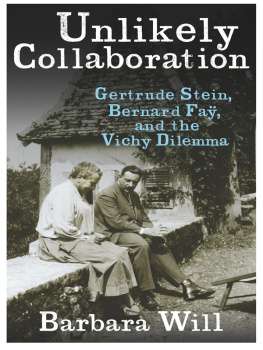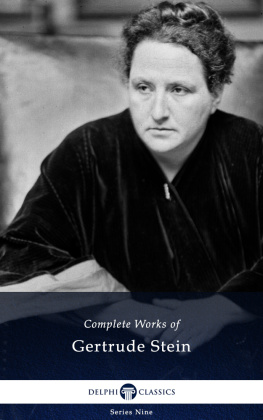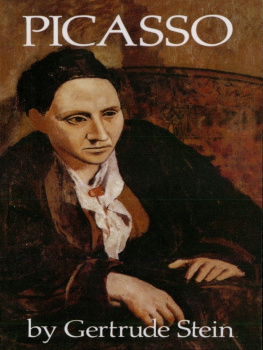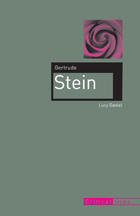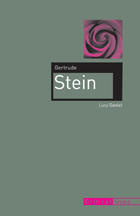Stein Gertrude - Mama Dada: Gertrude Steins avant-garde theater
Here you can read online Stein Gertrude - Mama Dada: Gertrude Steins avant-garde theater full text of the book (entire story) in english for free. Download pdf and epub, get meaning, cover and reviews about this ebook. City: New York;United States, year: 2005, publisher: Routledge, genre: Non-fiction. Description of the work, (preface) as well as reviews are available. Best literature library LitArk.com created for fans of good reading and offers a wide selection of genres:
Romance novel
Science fiction
Adventure
Detective
Science
History
Home and family
Prose
Art
Politics
Computer
Non-fiction
Religion
Business
Children
Humor
Choose a favorite category and find really read worthwhile books. Enjoy immersion in the world of imagination, feel the emotions of the characters or learn something new for yourself, make an fascinating discovery.
- Book:Mama Dada: Gertrude Steins avant-garde theater
- Author:
- Publisher:Routledge
- Genre:
- Year:2005
- City:New York;United States
- Rating:4 / 5
- Favourites:Add to favourites
- Your mark:
- 80
- 1
- 2
- 3
- 4
- 5
Mama Dada: Gertrude Steins avant-garde theater: summary, description and annotation
We offer to read an annotation, description, summary or preface (depends on what the author of the book "Mama Dada: Gertrude Steins avant-garde theater" wrote himself). If you haven't found the necessary information about the book — write in the comments, we will try to find it.
Mama Dada: Gertrude Steins avant-garde theater — read online for free the complete book (whole text) full work
Below is the text of the book, divided by pages. System saving the place of the last page read, allows you to conveniently read the book "Mama Dada: Gertrude Steins avant-garde theater" online for free, without having to search again every time where you left off. Put a bookmark, and you can go to the page where you finished reading at any time.
Font size:
Interval:
Bookmark:

Mama Dada
Kimball King, Series Editor
Theatre under Deconstruction?
A Question of Approach
by Stratos E. Constantinidis
The Pinter Ethic
The Erotic Aesthetic
by Penelope Prentice
Past Crimson, Past Woe
The Shakespeare-Beckett Connection
edited by Anne Marie Drew
Barnestorm
The Plays of Peter Barnes
by Bernard F. Dukore
New Theatre Vistas
Modern Movements in International
Theatre
edited by Judy Lee Oliva
David Mamet's Glengarry Glen Ross
Text and Performance
edited by Leslie Kane
Hollywood on Stage
Playwrights Evaluate the Culture Industry
edited by Kimball King
Reading Stephen Sondheim
A Collection of Critical Essays
edited by Sandor Goodhart
Black Women Playwrights
Visions on the American Stage
edited by Carol P. Marsh-Lockett
John Osborne
Vituperative Artist
edited by Luc Gilleman
Modern Dramatists
A Casebook of Major British, Irish, and American Playwrights
edited by Kimball King
The Theater of Tony Kushner
Living Past Hope
by James Fisher
Alan Bennett
A Critical Introduction
by Joseph H. O'Mealy
The Playwright's Muse
edited by Joan Herrington
Peering Behind the Curtain
Disability, Illness, and the Extraordinary Body in Contemporary Theater
edited by Thomas Fahy and Kimball King
Captive Audience
Prison and Captivity in Contemporary Theater
edited by Thomas Fahy and Kimball King
Mama Dada
Gertrude Stein's Avant-Garde Theater
by Sarah Bay-Cheng
Gertrude Steins Avant-Garde
Theater
Sarah Bay-Cheng
Routledge
New York and London
Published in 2004 by
Routledge
711 Third Avenue
New York, NY 10017
Published in Great Britain by
Routledge
2 Park Square, Milton Park
Abingdon, Oxon OX14 4RN
Copyright 2004 by Taylor & Francis Books, Inc.
Routledge is an imprint of the Taylor & Francis Group.
Transferred to Digital Printing 2007
All rights reserved. No part of this book may be reprinted or reproduced or utilized in any form or by any electronic, mechanical or other means, now known or hereafter invented, including photocopying and recording or in any information storage or retrieval system, without permission in writing from the publisher.
Permission to quote from the following is gratefully acknowledged: Plays and Portraits and Repetition from Lectures in America by Gertrude Stein, copyright 1935 and renewed 1963 by Alice B. Toklas. Used by permission of Random House, Inc. From Wars I Have Seen by Gertrude Stein, copyright 1945 by Random House, Inc. Used by permission of Random House, Inc. Four Saints in Three Acts, They Must. Be Wedded. To Their Wife., A Movie, Film. Deux Soeurs Qui Ne Sont Pas from Operas and Plays by Gertrude Stein. Used by permission of Station Hill Press, Inc. A Portrait of Constance Fletcher and The Psychology of Nations from Geography and Plays by Gertrude Stein. Used by permission of the University of Wisconsin Press. Composition as Explanation and What Are Master-pieces and why are there so few of them, by Gertrude Stein. Used by permission of Peter Owen Ltd., London. Doctor Faustus Lights the Lights, Listen to Me, The Mother of Us All, A Photograph, and Yes Is for a Very Young Man from Last Operas and Plays by Gertrude Stein, ed. by Carl Van Vechten. Used by permission of the Estate of Gertrude Stein. Previously unpublished notes by Gertrude Stein on Doctor Faustus Lights the Lights and Yes Is for a Very Young Man, Wars I Have Seen are used by permission of the Estate of Gertrude Stein. How Writing is Written and Reflection on the Atomic Bomb by Gertrude Stein are used by permission of the Estate of Gertrude Stein. Robert Wilsons program notes for Gertrude Steins Four Saints in Three Acts are used by permission of the Byrd Hoffman Water Mill Foundation.
Studies in Modern Drama, Volume 20
Library of Congress Cataloging-in-Publication Data
Bay-Cheng, Sarah.
Mama Dada: Gertrude Steins avant-garde theater / by Sarah Bay-Cheng.
p. cm.(Studies in modern drama)
Includes bibliographical references (p. ) and index.
ISBN 0-415-96893-3 (acid-free paper)
1. Stein, Gertrude, 1874-1946Dramatic works. 2. Experimental drama,
AmericanHistory and criticism. 3. Avant-garde (Aesthetics)United States-History
20th century. I. Title. II. Series.
PS3537.T323Z548 2003
812'. 52dc21
Publishers Note
The publisher has gone to great lengths to ensure the quality of this reprint but points out that some imperfections in the original may be apparent
For Bert Cardullo
Routledge is delighted to publish Mama Dada , the first book to examine Gertrude Stein's drama within the history of the theatrical and cinematic avant-gardes. This book addresses the growing interest in Stein's theater by offering the first detailed analyses of her major plays, and by considering them within a larger history of avant-garde performance. Unique to this study is a three-part model of avant-garde drama, which argues that a significant and heretofore unrecognized relationship exists among the histories of avant-garde drama, cinema, and homosexuality. Using the posited connection among the avant-garde, cinema, and queerness as the foundation for this study, Mama Dada examines in detail Stein's major plays, distinguishing for the first time between her major and minor dramatic works. Finally, it considers the impact of Stein as a major influence on the American avant-garde, in particular her influence on The Living Theater, Richard Foreman, and Robert Wilson. Thus it is a fitting addition to Routledge's STUDIES IN MODERN DRAMA series.
Sarah Bay-Cheng received her B.A. from Wellesley College and Ph.D. in theater from the University of Michigan, Ann Arbor. She currently teaches in English and theater at Colgate University, and her co-edited anthology, The False and Fallen Staff: A Collection of Falstaff Plays from Four Centuries is forthcoming from the University of Delaware Press. This current volume, at last, credits Stein with the recognition her theater work deserves.
Kimball King
I wish to thank the following institutions for their generous support of this project: the Institute for Research on Women and Gender at the University of Michigan, which provided research support when this project was in its infancy; the Rackham School of Graduate Studies at the University of Michigan for their support of my early research; and the Colgate University Research Council for their generous support of research in the final stages of preparation. Thanks also to the staff at the Beinecke Library of Rare Books and Manuscripts at Yale University for access to Gertrude Stein's notebooks and papers, and for answers to numerous questions; Aaron Beebe, archivist for Byrd Hoffman Water Mill Foundation; and Clay Hapaz, archivist for the Wooster Group. I am further indebted to Anne Bogart, Mary Gearhart, and Paula Court for generously sharing their time and work with me. Thanks to the staff at Routledge who have done so much, and especially to Kimball King for his support, advice, and general enthusiasm for this project.
My special thanks to Bert Cardullo for his passion and guidance through the years; it is to him that this book is dedicated. I would also like to thank Anne Herrmann, Johannes von Moltke, and Leigh Woods for their comments on early drafts of this manuscript, and Amy Feinstein for helping me battle through the end of it. For their inspiration, I would also like to thank Larry Rosenwald, who profoundly shaped my studies in theater and the avant-garde, Robert Knopf, who first encouraged me to consider Stein, and Ellen Gainor, who was always willing to talk. Finally, my sincerest thanks to my parents, Mary Robinson and Richard Bay, who taught me to love theater, and especially to my partner, Laina Bay-Cheng, who took so much time and energy from her own work to help with this project.
Font size:
Interval:
Bookmark:
Similar books «Mama Dada: Gertrude Steins avant-garde theater»
Look at similar books to Mama Dada: Gertrude Steins avant-garde theater. We have selected literature similar in name and meaning in the hope of providing readers with more options to find new, interesting, not yet read works.
Discussion, reviews of the book Mama Dada: Gertrude Steins avant-garde theater and just readers' own opinions. Leave your comments, write what you think about the work, its meaning or the main characters. Specify what exactly you liked and what you didn't like, and why you think so.

